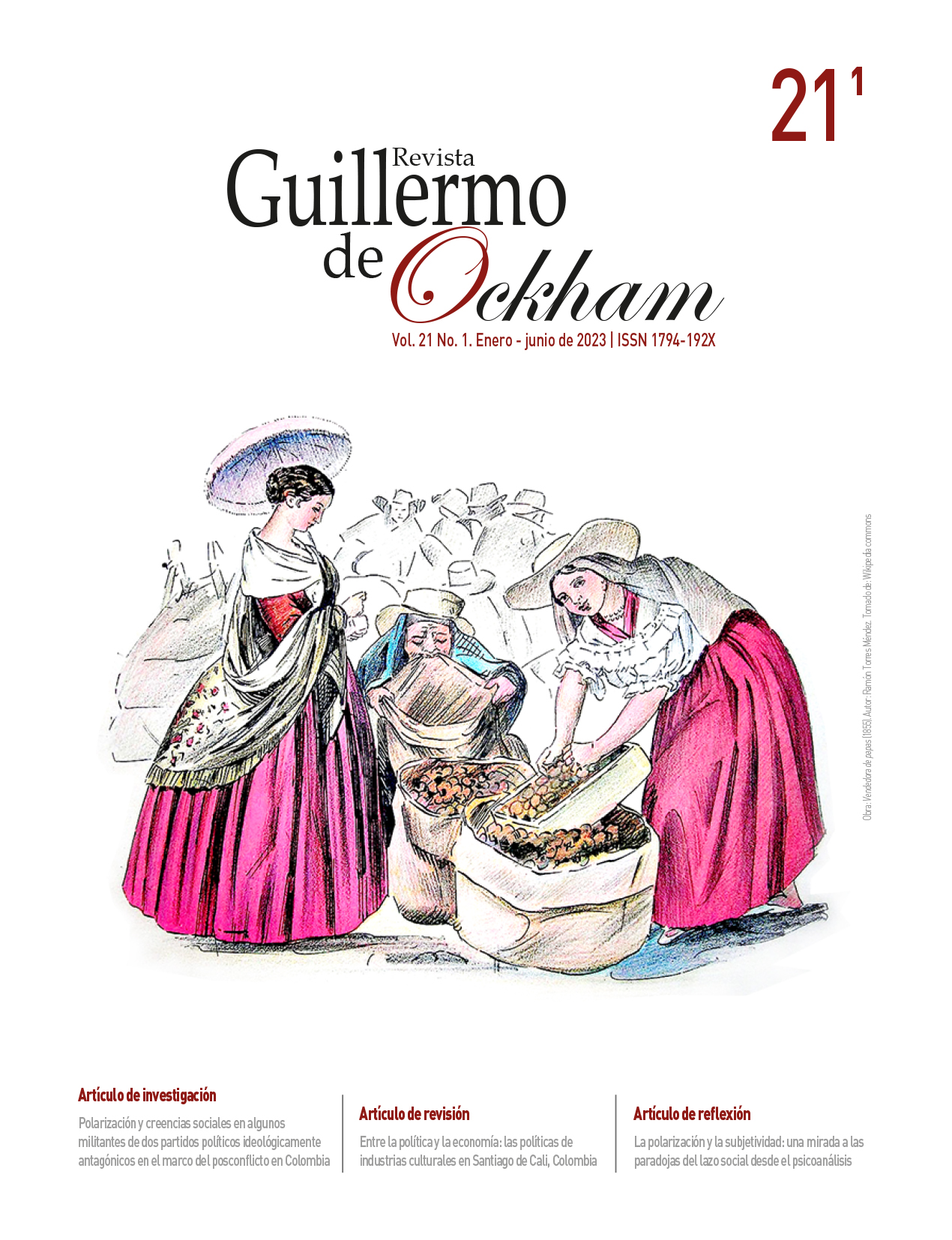The Revista Guillermo de Ockham provides an immediate and open access to its content, based on the principle of offering the public a free access to investigations to provide a global interchange of knowledge.
Unless otherwise established, the contents of this journal has a license with Creative Commons Attribution-NonCommercial-NoDerivatives 4.0 International (CC BY-NC-ND 4.0) http://creativecommons.org/licenses/by-nc-nd/4.0/
- Attribution: You must give appropriate credit, provide a link to the license, and indicate if changes were made. You may do so in any reasonable manner, but not in any way that suggests the licensor endorses you or your use.
- NonCommercial: You may not use the material for commercial purposes.
- NoDerivatives: If you remix, transform, or build upon the material, you may not distribute the modified material.
- No additional restrictions: You may not apply legal terms or technological measures that legally restrict others from doing anything the license permits.
Abstract
Throughout his intellectual life, the Polish philosopher Karol Wojtyla carried out various studies. This article reviews the fourteenth chapter of the first part of the work My vision of man, which is entitled What is asceticism? In it, Wojtyla begins a series of introductory analyzes on ethics: the meaning of duty; position on pleasure; what is asceticism, among others. Our research focuses on five aspects: (1) Differences between spiritual, material and religious values; (2) Emotions in the light of axiology; (3) Three forms of self-knowledge to defend spiritual values; (4) Utility and utilitarianism; (5) Values lived from asceticism; All of the above applying an anthropological-philosophical method, to conclude by affirming that the attraction of material values is stronger than a spiritual value, even though the latter is objectively superior.
Keywords:
References
Bowne, B. P. (1908). Personalism. The Riverside Press.
Burgos, J. M. (2010). Antropología breve. Ediciones Palabra.
Casanova, G. (2012, mayo). El utilitarismo y la deconstrucción en la ética. Asociación Española de Personalismo. https://bit.ly/3EXiYzm
Chesterton, G. K. (2010). Los libros y la locura, y otros ensayos. El Buey Mudo.
Editrama. (2020, 25 de octubre). José Luis López Aranguren, “A fondo” - Edición completa y restaurada [Video]. YouTube. https://youtu.be/EkVDHC_5wo4
Gómez Álvarez, N. (2015). La persona como innovación radical de la realidad en Julián Marías. Quién: Revista de Filosofía Personalista, (1), 55-73. https://bit.ly/3odSF0K
Guardini, R. (s.f.). Quién es el hombre. Almudi. https://www.almudi.org/articulos-antiguos/7289-quien-es-el-hombre-romano-guardini
Laín Entralgo, P. (2012). El cuerpo humano: Oriente y Grecia antigua. Biblioteca Virtual Miguel de Cervantes. https://bit.ly/3qj816U
López, A. F. (2016). Personalismo filosófico y fenomenología de la persona. Editorial Universidad Pontificia Bolivariana.
Lozano Arco, S. (2016). La interpersonalidad en Karol Wojtyla (II). Quién: Revista de Filosofía Personalista, (3), 35-49. https://dialnet.unirioja.es/servlet/articulo?codigo=5577874
Marías, J. (1947). Introducción a la filosofía. Manuales de la Revista de Occidente.
Sanabria, F. [Ciudad no virtual]. (2010, 17 de noviembre). Espiritualidad vs. teligión [Video]. YouTube. https://youtu.be/g4yYkqCU7S8
Wojtyla, K. (1978). Amor y responsabilidad. Biblioteca Palabra.
Wojtyla, K. (1982a). Max Scheler y la ética cristiana. Biblioteca de Autores Cristianos.
Wojtyla, K. (1982b). Persona y acción. Biblioteca de Autores Cristianos.
Wojtyla, K. (1997). Mi visión del hombre. Biblioteca Palabra.
Wojtyla, K. (1998). El hombre y su destino. Biblioteca Palabra.
Wojtyla, K. (2014a). Lecciones de Lublin (II). Biblioteca Palabra.
Wojtyla, K. (2014b). Lecciones de Lublin (I). Biblioteca Palabra.

































